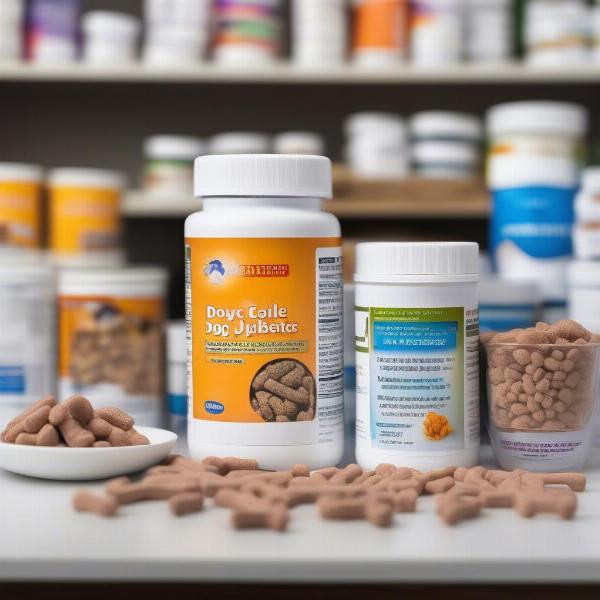High calorie supplements for dogs can be a valuable tool for maintaining a healthy weight, especially in certain situations. Whether your dog is a picky eater, recovering from illness, a highly active working dog, or simply a senior struggling to keep weight on, these supplements can provide the extra boost they need. Understanding when and how to use these supplements is crucial to ensuring your dog’s well-being.
Why Might a Dog Need High Calorie Supplements?
Several factors can contribute to a dog needing a calorie boost. Active working dogs, like those involved in herding, agility, or search and rescue, burn significant energy and require more calories to maintain their performance. Similarly, pregnant or lactating dogs have increased energy demands to support their puppies. Senior dogs often experience a decline in appetite and metabolism, making it difficult to maintain a healthy weight. Illness or recovery from surgery can also lead to weight loss, and high calorie supplements can help in these situations. Finally, some dogs are simply picky eaters and may not consume enough calories from their regular diet.
 High Calorie Dog Food Supplements
High Calorie Dog Food Supplements
Different Types of High Calorie Supplements
High calorie supplements come in various forms, offering flexibility for different dog preferences and needs. Calorie paste, often packaged in tubes, provides a concentrated source of calories and can be easily administered directly or mixed with food. Powder supplements can be sprinkled onto kibble or mixed with wet food, boosting the overall caloric density of the meal. High-calorie treats offer a palatable way to sneak in extra calories, particularly for picky eaters. Additionally, some high-calorie dog foods are formulated specifically to provide more energy and nutrients.
Choosing the Right Supplement for Your Dog
Selecting the right high calorie supplement requires careful consideration of your dog’s individual needs and preferences. Consult your veterinarian to determine the appropriate type and amount of supplement for your dog’s specific situation. They can assess your dog’s health, activity level, and dietary requirements to make personalized recommendations. Consider your dog’s taste preferences when choosing between different flavors and textures. dog treats beef If your dog is a picky eater, palatable treats or flavored pastes might be more appealing. Always check the ingredient list to ensure the supplement is made with high-quality ingredients and doesn’t contain anything that could be harmful to your dog.
How to Introduce High Calorie Supplements
Introduce high calorie supplements gradually to avoid digestive upset. Start with a small amount and slowly increase the dosage as recommended by your veterinarian. Monitor your dog’s weight and adjust the supplement accordingly to achieve and maintain a healthy weight. If using a calorie paste, you can offer it directly to your dog, mix it with their food, or use it as a topping. Powder supplements can be easily sprinkled onto kibble or mixed with wet food. beef dog treats High-calorie treats can be given as rewards or incorporated into mealtimes.
Monitoring Your Dog’s Progress
Regularly monitor your dog’s weight and overall health while using high calorie supplements. good dog food for basset hounds Observe for any changes in appetite, energy levels, or stool consistency. If you notice any adverse reactions, discontinue the supplement and consult your veterinarian. Regular check-ups with your veterinarian are essential to ensure the supplement is meeting your dog’s needs and to make any necessary adjustments to the dosage or type of supplement.
Conclusion
High calorie supplements can be a beneficial addition to a dog’s diet in various circumstances. By understanding the different types of supplements available, choosing the right one for your dog’s needs, and monitoring their progress, you can help your dog maintain a healthy weight and overall well-being. Remember to consult with your veterinarian before starting any new supplement regimen to ensure it’s the best option for your furry friend.
FAQ
- When should I give my dog a high-calorie supplement? Consult your vet, but typically when they’re underweight, recovering from illness, pregnant/lactating, senior, or highly active.
- What are the different types of high-calorie supplements? Common forms include calorie paste, powder supplements, and high-calorie treats.
- Can I give my dog human high-calorie supplements? No, always use supplements specifically formulated for dogs. Human supplements may contain ingredients toxic to dogs.
- How much high-calorie supplement should I give my dog? Follow your veterinarian’s recommendations for dosage, as it varies based on individual needs.
- What should I do if my dog experiences side effects from a high-calorie supplement? Discontinue use and contact your vet immediately.
- Are there any natural ways to increase my dog’s calorie intake? Yes, adding healthy fats like fish oil or cooked chicken to their food can help. beef trachea for dogs safe Always consult your vet before making dietary changes.
- How often should I monitor my dog’s weight while using a high-calorie supplement? Regular weigh-ins, at least weekly initially, are recommended to track progress and adjust dosage as needed.
ILM Dog is a leading international online resource dedicated to providing expert advice on dog care and wellbeing. We offer comprehensive information on dog breeds, health, training, nutrition, and more. From puppy care to senior dog needs, ILM Dog is your trusted companion on your dog ownership journey. Contact us today at [email protected] or +44 20-3965-8624 for personalized advice and support. Visit ILM Dog for more information.